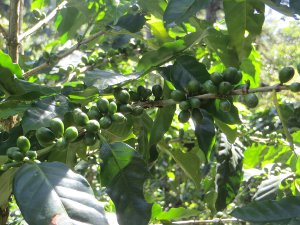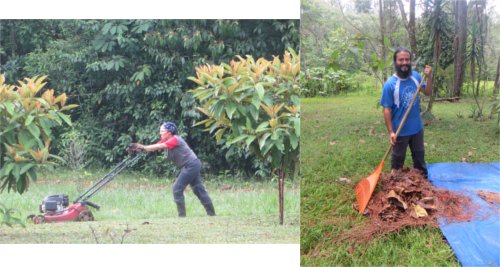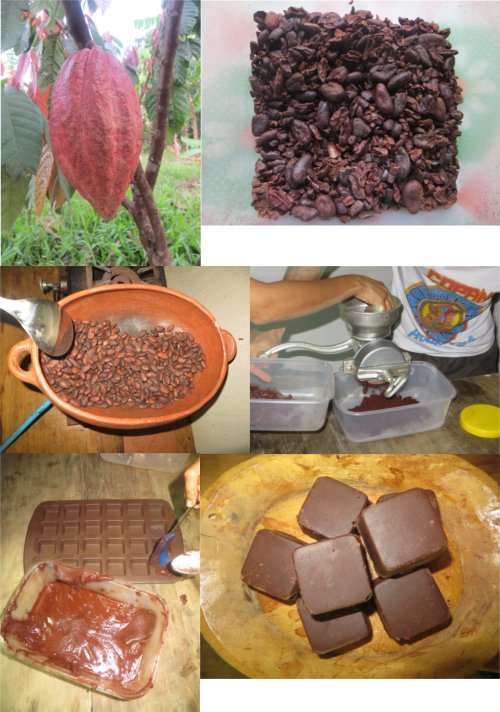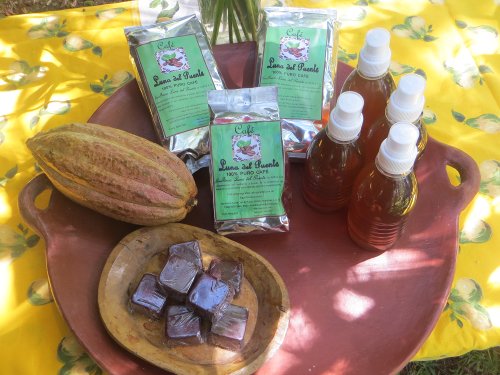WWOOFing in San Isidro
We were volunteering at Ecofinca Luna del Puente for 8 days from June 19, 2016. This extensive family property is located in San Isidro, on the east side of Yojoa Lake in Honduras, not far from Santa Cruz town. The land was purchased by Mrs. Fanny and her diseased husband 25 years ago. When they bought it, the property was used for cows but through their conscious efforts it became a private natural reserve with sustainable and organic crops of coffee, cocoa, bananas, oranges, a variety of other fruit trees, and tropical plants. The natural reserve is home to multiple species of birds and the family in charge of this project works very hard to keep the trees and animals protected from local hunters.

Today Mrs. Fanny and her daughter Cecilia, who is an agronomist, directly oversee this interesting project where tourists can also camp and enjoy nature. While we were there we had direct interactions with them and with Mariana (Cecilia’s daughter), Damian (Cecilia’s boyfriend from Argentina), Gaby (Mariana’s friend), and Mr. Jose (a local worker).

During our time at Luna del Puente, we worked from Monday to Saturday for six hours each day from 6am until 1pm with a one hour breakfast break from 9 to 10am. In exchange of our volunteer work, we received a place to stay, lunch, and dinner during our working days, but breakfast and meals on Sunday were at our own expense. During our stay, we slept in a simple and enjoyable house.
Our assignments at the property were mostly focused on gardening, cutting, cleaning, and trimming the grass and ornamental plants in the gardens and social areas for an important meeting for the private natural reserves in the region. Overall, the tasks were tiring and boring. Gisela only did gardening, and she got to cut the grass with the lawn mower, it was the first time she used this machine, what a work out! Sal worked with Mr. Jose the first day in the coffee plantations uncovering the soil with the purpose of adding compost and another day we both helped with the cocoa fruit, after it was harvested we immediately extracted the seeds from the pods. The rest of the days we cut and raked the grass around the main house.

We were at Luna del Puente in the beginning of the rainy season and many huge and interesting mushrooms started to grow around the property. Although our work shifts were long and exhausting, the beauty of the place paid for our efforts. The farm does not have running electricity to charge electronics, at night we had some light thanks to solar panels. It was a perfect setting to disconnect from the rest of the world and be in the present. Nothing like taking a shower, laying, and reading after six strenuous hours of garden work with the sounds of the rain or the birds in the background.

The most exciting experience at Ecofinca was having the hands-on experience with the harvesting of cocoa and the artisanal way of producing chocolate for consumption. This was not only an interesting process to learn but also very meaningful, as cocoa was the fruits of the gods for the ancestral indigenous groups in Central America. Recently and with the support of international organizations, local farmers started to replant cocoa. Cecilia is a certified cocoa taster and she is very invested into this new crop. A significant number of Trinitario cocoa trees (a variety of cocoa) are now growing in Luna del Puente. Damian and Cecilia helped us navigate with them into this new venture, showing us around their cocoa plantations, allowing us to harvest and taste the delicious cocoa pulp, giving us information about the process, and allowing us to have fun making chocolate. These are the steps and what we learned about cocoa:
Trinitario cocoa plants start giving fruit after two years of being planted and it takes about six months for a fruit to develop from a flowering bloom to harvesting.
After harvesting, the fruit pulp with the seeds can be placed inside a wooden box covered with banana leaves for fermentation for about five to seven days. The fruit must be turned every 24 hours to allow air into the process and regulate the temperature. Although this fermentation process increases the quality of the cocoa, unfortunately not too many farmers in Honduras are open to implement it yet.

- After fermentation, the cocoa must be dried. The first day the fruit must be dried under the shade. The direct sun exposure must be incremental in a process of five to seven consecutive days beginning with only one hour the second day.
- After the cocoa has been dried, then it can be toasted. The toasting can be done in a artisanal way by placing the cocoa inside a clay pot under the fire and turning them constantly.
- Once the cocoa is toasted, it should be peeled. The cocoa skin is excellent to make delicious cocoa tea.
- The toasted cocoa seeds can now be grinded. A mixture of 70% cocoa to 30% sugar is ideal for a hot cocoa drink. Both ingredients can be grind until creating a homogeneous paste, which can be place into small molds. At room temperature, the cocoa sugar mixture will solidify and can later be dissolved into hot milk or water to enjoy! 🙂

This WWOOFing experience inspired us in many ways. We deeply admired Mrs. Fanny commitment and ability to turn this cow farming land into the paradise that it is today. Her vision of preserving the forest is an example of what we all as individuals could do to help attain the goal of saving mother earth. We felt privileged of making a little contribution to this important effort and dream about building our own project one day. Buying land to preserve the forest, plant, and live a good retirement somewhere in Latin America sounds ideal. The people we met at Luna del Puente positively impacted us. In one hand, were the family of owners: Mrs. Fanny the grandmother, Cecilia the mother, and Mariana the daughter; three generations of Honduran women characterized by their tenacity, motivation, and self-determination. We admire how eager the three act to accomplish their goals and how committed they are to projects that positively impact their communities: Mrs. Fanny, a former high school teacher for many years, and founder of Ecofinca Luna del Puente; Cecilia, an agronomist with many years of work experience, now leader of Ecofinca Luna del Puente; Mariana, a high school student and black belt in taekwondo, with only 17 years of age she is already teaching this martial art to children, teenagers, and adults in San Isidro, building a taekwondo school to prevent violence and offer a positive outlook to the youth. In the other hand, was Mr. Jose, a Honduran farmer with who we worked side by side and even though he is much older than us, we were never able to catch up to his fast work rhythm. He was always much faster and productive than we were. He was also a caring man, from our arrival to the farm, he offered his help when he saw us struggle with the work, asking us if we were tired and even sharing his candies to lift our energy up. His empathy touched us. He does not have any close family, his parents are diseased, he never married, nor had children. As he said: “All I have is God,” and despite his loneliness and difficulties, he does not give up in life. He wakes up early every day, embraces his hard work as a farmer, and cares and is kind towards others. He expressed his faith in God as his strength. His generosity and selfishness was an example of how amazing those who have least means are. The day we were leaving Mr. Jose insisted in giving us all his candies, he blessed us with his words and his look full of nostalgia and good wishes. He said, “God will protect you and take you well until the end of your journey, believe in him.” We hugged him tight, thanking him for sharing with us all he truly has. As we left him behind, distancing ourselves from the coffee plantations, we were sadly aware of our disparities, the hard-working days at Luna del Puente were an option for us, we could leave at any time, but for Mr. Jose it was all he knows and can do to earn a living. The socioeconomic injustice of our world, in which farming is not well paid or appreciated, infuriates us. How illogical can it be, we all need to eat, but those working the land and making it possible are the least paid. We have been in farmers’ shoes and got a taste of their struggles all over the world, we will never forget them, we will never stop valuing what they do for all of us!
Leaving Ecofinca Luna del Puente was bitter sweet. Reaching the end to this volunteering experience was a closing to the cycle of wonderful WWOOFing adventures along Our First World Trip. So many places and so many lessons. Lovely families that have embraced us across all the continents we visited. Since New Zealand to Honduras we have been welcomed, nurtured, and thought so much. The mix of joy and nostalgia was indeed immense. We look forward to putting into practice everything we have been so fortunate to live and learn. 🙂
